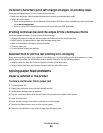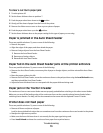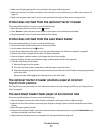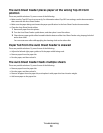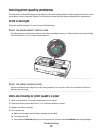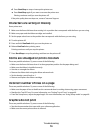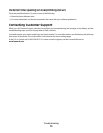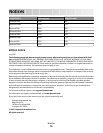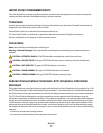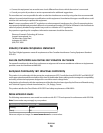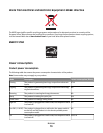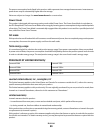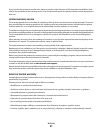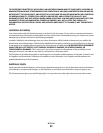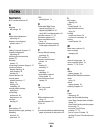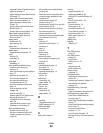
UNITED STATES GOVERNMENT RIGHTS
This software and any accompanying documentation provided under this agreement are commercial computer
software and documentation developed exclusively at private expense.
Trademarks
Lexmark and Lexmark with diamond design, ExecJet, and Proprinter are trademarks of Lexmark International, Inc.,
registered in the United States and/or other countries.
Personal Printer Series is a trademark of Lexmark International, Inc.
ITC Avant Garde Gothic is a trademark or registered trademark of International Typeface Corporation.
All other trademarks are the property of their respective owners.
Conventions
Note: A Note identifies something that could help you.
Warning—Potential Damage: A Warning identifies something that could damage your product hardware or
software.
CAUTION—POTENTIAL INJURY: A CAUTION identifies something that could cause you harm.
CAUTION—DO NOT TOUCH: This type of CAUTION indicates that you should not touch the marked area.
CAUTION—HOT SURFACE: This type of CAUTION indicates a hot surface.
CAUTION—SHOCK HAZARD: This type of CAUTION indicates a shock hazard.
CAUTION—TIPPING HAZARD: This type of CAUTION indicates a tipping hazard.
Federal Communications Commission (FCC) compliance information
statement
This product has been tested and found to comply with the limits for a Class B digital device, pursuant to Part 15 of
the FCC Rules. Operation is subject to the following two conditions: (1) this device may not cause harmful interference,
and (2) this device must accept any interference received, including interference that may cause undesired operation.
The FCC Class B limits are designed to provide reasonable protection against harmful interference when the
equipment is operated in a residential installation. This equipment generates, uses, and can radiate radio frequency
energy and, if not installed and used in accordance with the instructions, may cause harmful interference to radio
communications. However, there is no guarantee that interference will not occur in a particular installation. If this
equipment does cause harmful interference to radio or television reception, which can be determined by turning
the equipment off and on, the user is encouraged to try to correct the interference by one or more of the following
measures:
• Reorient or relocate the receiving antenna.
• Increase the separation between the equipment and receiver.
Notices
77



